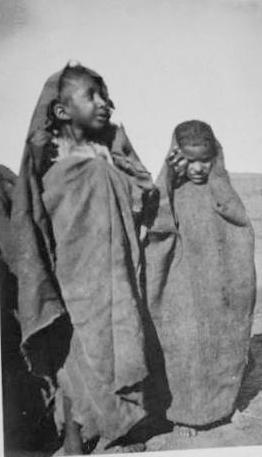
Figure 1.-- This photograph taken by an Italian soldiers shows two Linyan boys he came across when he arrived in Libya. |

|
Italy began the final assault on the Ottoman Empire by declaring war in this case to secure a new colony in North Africa--Libya. The Italo-Turkish War (1911-12) while fought outside the Balkans, weaked the Ottoman Army in the years just before World War I. The Italian Navy bombrded the major ports. They seized Tripoli (October 3). There was only minimal resistance. The Italians proceeded to occupy Tobruk, Al Khums, Darnah, and Benghazi. The Italian expeditionary force of about 35,000 troops did not moved beyond the coasual ports they seized. The Italians became the first country to drop ordinance from an airplane in warfare. They tossed grenades from a German-built monoplane. The small Ottoman force of about 5,000 troops withdrew inland. Commanders like Enver Pasha and Mustafa Kemal (Atatürk) resisted the Italians, in part by arming the Arab tribes. They used the unifying force of Islam to motivate the Arabs to resist the Italians. This proved effective in creating a deadlock. The Ottomons, however, faced a more important war in the Balkans and thus decided to yield Libya. Under the terms of the Treaty of Lausanne (October 1912). The Ottomon Sultan granted independence to the provinces of Tripolitania and Cyrenaica. The Ottomons largely ceeded to Italian demands because of the worsening situation in the Balkans, an area of much greater importance to them. The Ottomons were unwilling to make a major military commitment to defending Libya. The Ottomons were, however, then further humiliated in the First and Second Balkan Wars (1912-13). The Sanusis had to resist Italian encroachments without Ottomon assistance. Italy immediately annexed both provinces. The Treaty permitted the Sultan who insisted on the position of caliph (leader of Islam) to have religious jurisdiction. The Sultan continued to appoint the qadi of Tripoli who was responsible for Islamic sharia courts. The Italians had agreed to this with fully understanding that these courts not only had authority over religious, but civil maters as well. This afforded the Ottomons continued influence in Libya.
Navigate the Children in History Website:
[Return to Main Balkan Wars page]
[Return to Main 20th century war page]
[About Us]
[Introduction]
[Biographies]
[Chronology]
[Climatology]
[Clothing]
[Disease and Health]
[Economics]
[Freedom]
[Geography]
[History]
[Human Nature]
[Ideology]
[Law]
[Nationalism]
[Presidents]
[Religion]
[Royalty]
[Science]
[Social Class]
[Bibliographies]
[Contributions]
[FAQs]
[Glossaries]
[Images]
[Links]
[Registration]
[Tools]
[Children in History Home]
